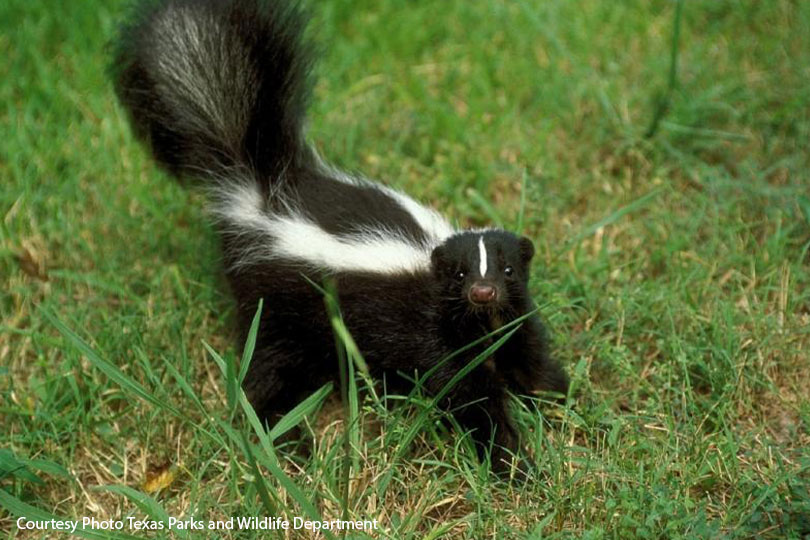By Jessica Domel
Multimedia Reporter
The Texas Parks and Wildlife Department (TPWD) urges those who come into contact with sick or dead birds, skunks and racoons to take basic precautions to prevent the spread of highly pathogenic avian influenza (HPAI).
HPAI is a highly-contagious disease that has led to the deaths of 58.65 million birds, including domestic poultry and wild birds, in 49 states.
And now, the disease has been found in a striped skunk in Texas.
It was the first case of HPAI in a mammal in the state.
According to TPWD, the skunk that tested positive was found in Carson County, which is east of Amarillo in the Panhandle.
HPAI can spread easily between animals through direct contact and through indirect contact with items in the environment, like poultry feeders and waterers used by an infected bird.
Waterfowl, like ducks and geese, may carry and spread HPAI but not become sick or show any symptoms of the disease.
Current data reveals mammals are most likely infected with HPAI after consuming the carcasses of infected animals.
TPWD says transmission of the disease from mammal-to-mammal doesn’t appear sustainable.
Racoons, foxes, bobcats, opossums, mountain lions and black bears are also susceptible to HPAI.
Symptoms include: incoordination and stumbling, tremors, seizures, lack of fear of humans, lethargy, coughing and sneezing or sudden death.
People who find wild animals exhibiting these symptoms are encouraged to contact their local TPWD wildlife biologist.
TPWD urges wildlife rehabilitators to use caution and consider quarantining any animals that exhibit HPAI symptoms.
The public should take basic protective measures, like wearing gloves and face masks and hand washing, when coming into contact with HPAI susceptible species.
The transmission of HPAI from birds to people is considered low.
According to the Centers for Disease Control and Prevention (CDC), one person in the United States has tested positive for HPAI. CDC reports that person was in Colorado. The individual had direct exposure to poultry and was involved in the depopulating of a poultry flock with H5N1 bird flu.
The person reported to be fatigued for a few days, was treated with an antiviral drug and has since recovered.
CDC noted people who have job-related or recreational exposure to infected birds are at a higher risk for infection and should take precautions.
To date, bird flu has been found in at least 148 mammals across the United States.
The U.S. Department of Agriculture (USDA) is also tracking the spread of HPAI in wild and domestic birds.
In Texas, the virus has been confirmed in at least 200 wild birds, including teal, owls, gadwall and bald eagles.
HPAI was found in a commercial pheasant flock in Erath County in North Texas in April 2022. Officials believe the flock was infected by a wild bird.
There have also been cases of bird flu in household flocks in Hale, Lampasas, Denton, Rockwall and Dallas counties.
To protect domestic poultry, like chickens and turkeys, raisers are encouraged to increase biosecurity to prevent the spread of HPAI.
Tips include keeping visitors to a minimum, washing hands before and after coming into contact with poultry and wild birds, changing clothes before entering and leaving poultry houses, cleaning and disinfecting tools and other equipment and providing disposable boot covers for those coming into contact with poultry.
Symptoms of HPAI for domestic poultry include: coughing, sneezing, nasal discharge, and other signs of respiratory distress; lack of energy and appetite; decreased water consumption; decreased egg production and/or soft-shelled, misshapen eggs; incoordination; and diarrhea.
Avian influenza can also cause sudden death in birds even if they are not showing other symptoms.
The Texas Animal Health Commission (TAHC) urges poultry raisers who observe these symptoms to contact their veterinarian immediately.
Raisers without a veterinarian may contact TAHC at 1-800-550-8242.

